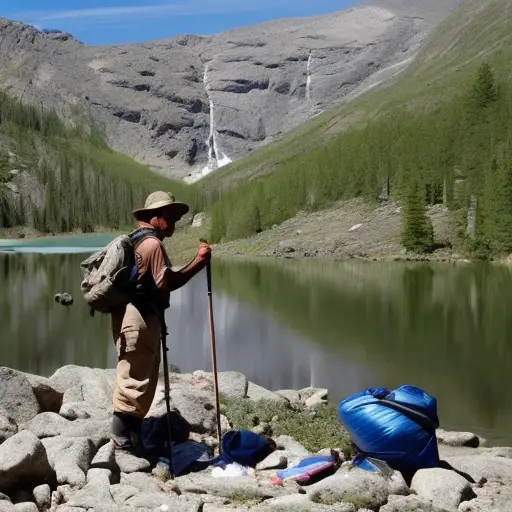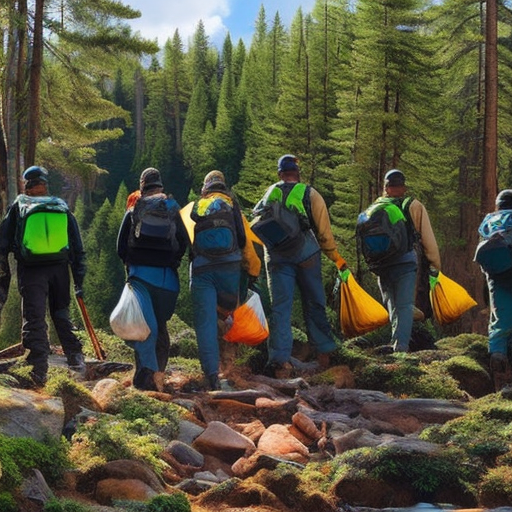How to Lead by Example: Being a Role Model for Ethical Wilderness Exploration

In the vast expanse of the wilderness, where nature’s beauty and solitude captivate the human spirit, there lies the responsibility to explore ethically.
As adventurers, we have the power to become role models, exemplifying the values of respect, stewardship, and conservation. This article aims to guide and inspire individuals on how to lead by example in their wilderness explorations.
By practicing leave no trace principles, respecting wildlife and their habitats, and supporting local communities, we can pave the way for a sustainable and ethical approach to wilderness exploration.
Understanding Ethical Wilderness Exploration
To understand ethical wilderness exploration, one must adhere to principles of environmental stewardship and responsible outdoor practices. Ethical decision making plays a crucial role in ensuring that our actions have a positive impact on the environment and the communities that rely on it. It involves considering the potential consequences of our choices and striving to minimize harm while maximizing benefits.
Sustainable outdoor practices are at the core of ethical wilderness exploration. This means engaging in activities that do not deplete or degrade natural resources, and that can be maintained over the long term without causing harm to the environment. It involves leaving no trace of our presence, minimizing our carbon footprint, and respecting the natural habitats and wildlife that inhabit these areas.
Ethical wilderness exploration also involves respecting the rights and cultures of indigenous communities and local inhabitants. It requires obtaining necessary permits and permissions, and engaging in activities that are sensitive to the cultural and spiritual significance of these areas. Additionally, it is important to support local economies and contribute to the well-being of communities that rely on tourism for their livelihoods.
Practicing Leave No Trace Principles
Practicing Leave No Trace principles is essential for ethical wilderness exploration. By minimizing environmental impact, we can ensure the preservation of fragile ecosystems and protect the natural beauty of our wilderness areas.
Responsible wilderness stewardship means leaving nature as we found it, so future generations can also enjoy the wonders of the outdoors.
Minimizing Environmental Impact
In the pursuit of ethical wilderness exploration, it is crucial to prioritize minimizing environmental impact through the implementation of Leave No Trace principles.
Ethical camping and sustainable travel are key components of this approach. Ethical camping requires campers to be mindful of their impact on the environment and to practice responsible behavior such as using designated campsites, minimizing campfire impact, and properly disposing of waste.
Sustainable travel involves reducing one’s carbon footprint by choosing environmentally-friendly transportation options and supporting local businesses that prioritize sustainability.
Responsible Wilderness Stewardship
One must prioritize responsible wilderness stewardship by adhering to Leave No Trace principles. Responsible camping and practicing sustainable outdoor activities are essential for minimizing our impact on the environment. By following these principles, we can ensure that future generations can also enjoy the beauty and serenity of the wilderness.
To better understand responsible wilderness stewardship, let’s take a look at the Leave No Trace principles in the table below:
| Leave No Trace Principles | Description |
|---|---|
| Plan Ahead and Prepare | Properly plan for your trip, anticipate challenges, and equip yourself accordingly. |
| Travel and Camp on Durable Surfaces | Stick to designated trails and campsites to minimize damage to vegetation and wildlife habitats. |
| Dispose of Waste Properly | Pack out all trash and dispose of human waste in designated facilities. |
| Leave What You Find | Avoid disturbing natural features, artifacts, and wildlife. |
| Minimize Campfire Impacts | Use established fire rings or stoves, and be mindful of fire safety. |
| Respect Wildlife | Observe wildlife from a distance and do not feed or approach them. |
| Be Considerate of Other Visitors | Respect others’ experiences by being quiet, considerate, and following regulations. |
Respecting Wildlife and Their Habitats
Respecting wildlife and their habitats is crucial in ethical wilderness exploration.
This involves minimizing human-wildlife interactions to ensure the safety of both parties and protecting fragile ecosystems from disturbance.
Additionally, practicing responsible wildlife photography is essential to avoid causing stress or harm to the animals and their habitats.
Minimizing Human-Wildlife Interactions
Wilderness explorers should consistently prioritize the preservation of wildlife and their habitats to minimize human-wildlife interactions. By respecting wildlife and their habitats, we can help reduce the occurrence of human wildlife conflicts and promote wildlife conservation. This can be achieved through various strategies, such as maintaining a safe distance from wildlife, avoiding feeding or approaching them, and following designated trails to minimize disturbance to their habitats.
To further illustrate the importance of minimizing human-wildlife interactions, consider the following table:
| Strategies to Minimize Human-Wildlife Interactions |
|---|
| Keep a safe distance from wildlife |
| Do not feed or approach wildlife |
| Follow designated trails to avoid habitat disturbance |
| Dispose of waste properly to prevent wildlife attraction |
Protecting Fragile Ecosystems
To protect fragile ecosystems, it is crucial to prioritize the preservation of wildlife and their habitats, ensuring minimal disruption to their natural balance and promoting long-term ecological sustainability.
Fragile ecosystem conservation entails adopting responsible practices in order to minimize negative impacts on wildlife and their habitats. This involves respecting wildlife by keeping a safe distance, refraining from feeding or touching them, and avoiding behaviors that may disrupt their natural behaviors or habitats.
Sustainable tourism plays a vital role in protecting these ecosystems, as it promotes responsible and ethical travel practices that minimize environmental impact. By choosing eco-friendly accommodations, supporting local conservation initiatives, and following guidelines set by park authorities, visitors can contribute to the preservation of fragile ecosystems and ensure their long-term sustainability.
Responsible Wildlife Photography
Adhering to ethical principles of wilderness exploration, it is imperative to approach wildlife photography responsibly, ensuring the utmost respect for the well-being of animals and the preservation of their natural habitats.
Responsible wildlife photography contributes to wildlife conservation efforts by minimizing disturbance to animals and their habitats. Ethical photographers prioritize the welfare of the subjects they photograph and strive to capture their behavior in a non-invasive manner. This involves maintaining a safe distance, using telephoto lenses, and avoiding actions that may stress or harm the animals.
Additionally, ethical photographers respect the boundaries set by protected areas and follow the guidelines provided by local authorities. By practicing ethical photography, we can contribute to the preservation of wildlife and their habitats while creating powerful images that inspire others to appreciate and protect these magnificent creatures.
Supporting Local Communities and Indigenous People
By actively engaging with and supporting local communities and indigenous people, ethical wilderness explorers contribute to the preservation and sustainable development of these unique cultural and natural landscapes. Supporting local economies is crucial for the continued existence of these communities and the conservation of their traditions. When ethical explorers purchase goods and services from local businesses, they provide a source of income for the community members, helping to alleviate poverty and improve their quality of life. Furthermore, by respecting and valuing the cultural heritage of indigenous communities, explorers contribute to the preservation of their traditions and knowledge.
Ethical wilderness explorers also play a vital role in promoting cultural preservation. By immersing themselves in the local culture and engaging with indigenous people, they foster mutual understanding and respect. This interaction allows for the exchange of ideas and experiences, enriching both the explorers and the indigenous communities. Ethical explorers recognize that traditional knowledge and practices are invaluable, and they actively seek to learn from and support indigenous people in their efforts to preserve their cultural heritage.
In order to ensure the continued well-being of these communities and the protection of their land and resources, ethical wilderness explorers must actively engage with and support local communities and indigenous people. By doing so, they contribute to a sustainable future for these unique landscapes and promote the well-being of all involved.
This commitment to supporting local communities and indigenous people seamlessly transitions into the subsequent section about promoting safety and preparedness in the wilderness.
Promoting Safety and Preparedness in the Wilderness
Continuing the discussion on supporting local communities and indigenous people, ethical wilderness explorers can actively promote safety and preparedness in the wilderness through comprehensive training and equipped gear.
Outdoor skills and emergency preparedness are essential for anyone venturing into the wilderness. By prioritizing safety, ethical explorers can set an example for others and minimize the risks associated with wilderness activities.
One way to promote safety is by acquiring and honing outdoor skills. These skills include navigation, first aid, fire building, and survival techniques. Ethical wilderness explorers should invest time in learning and practicing these skills to ensure they are well-prepared for any situation that may arise. By demonstrating proficiency in outdoor skills, they inspire others to do the same.
Another crucial aspect of promoting safety is emergency preparedness. Ethical explorers should always carry the necessary gear and equipment, such as a map and compass, emergency shelter, fire-starting tools, and a first aid kit. They should also have a clear understanding of emergency protocols and communication methods in case of accidents or emergencies. By being prepared, ethical explorers can respond efficiently to any unforeseen circumstances and minimize the potential for harm.
Educating Others and Advocating for Conservation
To further support local communities and indigenous people, ethical wilderness explorers can contribute by educating others and advocating for conservation. Here are four ways to effectively educate others and promote conservation advocacy:
-
Organize workshops and seminars: Ethical wilderness explorers can organize educational workshops and seminars to raise awareness about the importance of conservation. These events can cover topics such as sustainable tourism, wildlife protection, and responsible outdoor practices. By sharing their knowledge and experiences, explorers can inspire others to become advocates for conservation.
-
Engage in community outreach: By actively engaging with local communities, ethical wilderness explorers can promote conservation efforts. This can be done through partnerships with local organizations, participating in community clean-up initiatives, or supporting environmental education programs. By involving communities in conservation efforts, explorers can foster a sense of ownership and responsibility.
-
Utilize social media platforms: Ethical wilderness explorers can leverage the power of social media to educate a wider audience about conservation. By sharing captivating stories, photos, and videos, explorers can inspire others to appreciate and protect the natural world. They can also use their platforms to raise awareness about conservation issues and encourage their followers to take action.
-
Advocate for policy changes: Ethical wilderness explorers can use their voice and influence to advocate for policy changes that support conservation efforts. This can include lobbying for the protection of endangered species, advocating for stricter regulations on waste management, or supporting initiatives that promote sustainable tourism practices. By actively participating in policy discussions, explorers can make a significant impact on conservation at a larger scale.
Frequently Asked Questions
What Are Some Common Challenges That People May Face When Practicing Ethical Wilderness Exploration?
When practicing ethical wilderness exploration, individuals may encounter obstacles such as limited access to resources, conflicting interests with local communities, and the need to prioritize environmental conservation. Overcoming these challenges is crucial in promoting responsible tourism.
How Can I Ensure That I Am Properly Prepared for a Wilderness Adventure?
Proper wilderness preparation involves acquiring essential gear and developing necessary skills. This ensures a successful adventure while minimizing risks. Research the environment, create a thorough checklist, and practice using equipment and techniques before embarking on your wilderness expedition.
Are There Any Specific Guidelines for Interacting With Wildlife While Exploring the Wilderness?
Interacting with wildlife in the wilderness requires adherence to specific guidelines for safety and ethical conduct. Leaders must model respectful behavior, avoiding direct contact, feeding, or disturbing wildlife, to ensure a harmonious coexistence between humans and wildlife.
How Can I Support Indigenous Communities and Local Economies During My Wilderness Explorations?
Supporting local communities and cultural preservation during wilderness exploration is crucial. This can be achieved by engaging in responsible tourism practices, purchasing goods and services from indigenous businesses, and respecting and learning from indigenous cultures and traditions.
What Are Some Effective Ways to Educate Others About the Importance of Conservation and Ethical Wilderness Exploration?
Promoting awareness and encouraging responsible behavior are essential in educating others about the importance of conservation and ethical wilderness exploration. By setting a positive example, providing educational resources, and advocating for sustainable practices, we can inspire others to follow suit.
Conclusion
In conclusion, by leading by example and embodying ethical principles in wilderness exploration, individuals can become role models for others to follow.
Through practicing Leave No Trace principles, respecting wildlife and habitats, supporting local communities and indigenous people, promoting safety and preparedness, and educating others about conservation, we can contribute to the preservation of our natural spaces.
By doing so, we pave the way for a sustainable future, ensuring that the beauty and resources of the wilderness can be enjoyed by generations to come.



